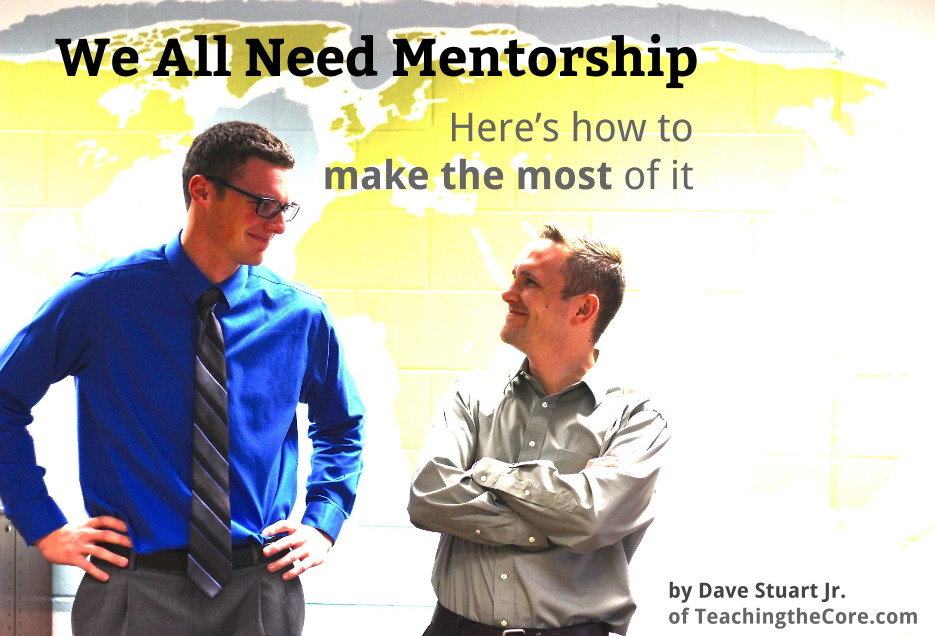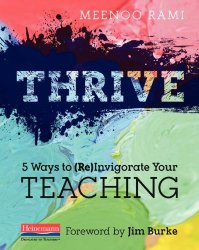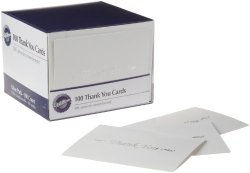
Lately, I've been kind of obsessed with helping the Teaching the Core community think deeply about their careers.
Part of that is because I love writing about this stuff; another part is because I sense that the group of educators who belong to this friendly movement of educators resonate with some of the following questions:
- Is my hard work doing anything?
- How's my impact:effort ratio as an educator?
- Is the way that I'm working sustainable?
- Am I sacrificing family or sanity on the altar of edu-success?
Toward helping with these questions over the past couple of months, we've defined impact, discussed the three levels of making an impact (the You Level, the Student Level, and the Adult Level [which includes how we work with admins, parents, and support staff]), and two weeks ago I shared one of the most cost-effective methods for getting yourself better at teaching: reading PD books the right way (and yes, there are wrong ways).
The cool thing is you've all been gracious to me as I've slowly and steadily sought to widen the scope of Teaching the Core. I started this blog in the hopes of promoting the long-term flourishing of as many students as possible. Initially, that was through an intensive focus on learning and owning the heart of the Common Core standards. I'm still convinced that the best way to increase long-term student flourishing in this country is through encouraged, empowered teachers who aggressively apply the 80/20 “Pareto Principle” to how they use their working hours.
So let's keep exploring how we become great at this job by looking at an often free form of professional development: authentic mentoring relationships.
In this post, I'm going to show you how to take charge of your own PD by identifying potential mentors, getting them in your corner, and keeping them on your side for the long haul. As always, we'll avoid tactics that aren't transparent and real — the goal here, after all, is a great relationship with someone who can teach you a thing or two. If this post comes off as a “How to Use People” tutorial, I've either failed in writing it or you've failed in reading it
Step 0. Get your head and heart ripe for mentoring (don't skip this part)
I can't overstate the importance of cultivating the head and heart of a great teacher. When I say head, I'm talking about how we think; when I say heart, I'm talking about the place from which we act, or the core of who we are.
That may sound philosophical and impractical, but I'd argue it's the opposite — we all experience times when we know in our heads what we should do, yet we instead do something else. When I know I should respond to a kid with compassion but instead act annoyed toward him, there's a head-heart, or knowing-doing, gap.
When our heads and hearts are properly calibrated, however, good teaching tends to flow from us with greater consistency.
Now, let's apply this head-heart construct to the task of finding and keeping great mentors. Here are a few considerations.
Your desire to learn must exceed your desire to critique
There's no point pursuing a mentor if you're just going to critique everything they say. If you're prone to comments like, “Well, that wouldn't work for me because…” or “My students would never go with something like that…” then save yourself the energy: a mentor won't do you much good.
The key to growing from someone's mentorship is teachability, and teachability is about finding what could work in someone's advice rather than focusing on what couldn't.
Adopt Meenoo Rami's “many mentors” mentality
 Meenoo Rami gets it perfect in Thrive when she describes her many mentors and how they've each played a distinct role in her growth as an educator. In the book, she lists:
Meenoo Rami gets it perfect in Thrive when she describes her many mentors and how they've each played a distinct role in her growth as an educator. In the book, she lists:
- The mentor who helps me see what's possible in my practice
- The mentor who dares me into new work
- The mentor who helps me fine-tune my instruction
- The mentor who helps me find community
- The mentor who helps me see what's possible in my writing life
- The mentor who helps me share my work publicly
- The mentor who helps me stay balanced
These folks range from her principal to a highly regarded author for English teachers to in-school colleagues to her sister. That's exactly how mentoring works in real life, isn't it?
And since real life isn't as cool as Star Wars, consider the many mentors of Luke Skywalker:
- Obi Wan taught Luke the beginnings of the Force
- Yoda covered the advanced classes
- Han Solo helped Luke loosen up
- Leia gave Luke emotional support
If you're going to get the most out of a mentoring relationship, this “many mentors” mindset is the right one to have. The famous proverb sums it up: “For lack of guidance [a classroom falls], but victory is won through many advisers” (Prov 11:14).
It's not a numbers game or a checkbox — it's a relationship
Many schools have formal mentoring programs for new teachers, but these relationships aren't guaranteed to be authentic.
Our goal here isn't to check off our “Get a Mentor” box on the career to-do list; it's to cultivate a relationship with someone who 1) you respect and 2) will push you to grow in some way. Not just anyone can be your mentor — they really need to have those two qualities.
In some cases, mentor-mentee relationships aren't one-directional, either. Some of the folks whom I respect and who push me the most (thus, people whom I would certainly consider mentors to me) may say that I do the same for them. Symbiotic mentoring relationships keep us engaged in The Work for years and years — be careful not to expect them, but be delighted when they develop.
You gotta start somewhere
If you're realizing you don't have any authentic mentors in your professional life right now (e.g., you can't make labels for folks like Meenoo does in her list), fear not. My hope for this post is that it will get you looking around — there are folks we can learn from in any school.
Step 1: Identify a possible mentor through asking, listening, and observing
Every school building has people in it you can learn from. However, it may not be simple finding them. Here are some tips:
Ask around
Ask students:
- Who's the best teacher in this building?
- Who in this building has had the greatest impact on you as a student?
- Who have you learned the most from?
Ask administrators or colleagues:
- I'm trying to get better at teaching — who do you think is knocking it out of the park in this school?
- Who in this building is great at __________? (If you have a particular area you want to improve in your practice)
Listen
Here are some things to keep an ear out for:
- So-and-so is so strict. (This is someone who might be able to teach you something about classroom management — remember, you don't have to be a clone of them; the idea is being teachable to them.)
- So-and-so is so funny. (They can teach you about humor — a highly learnable skill that can increase our instructional effectiveness.)
- So-and-so is so organized. (They can teach you to make better use of your time.)
- I used to hate Subject X, but then I had Mrs. _________. (They can teach you about relating content to students or making content more accessible).
Observe
One of my greatest mentors in my current placement is a man named Doug Stark. Want to know how I first decided I needed to learn all I could from him? It was how well his students could write.
I was teaching English 9, Second Semester, during my first year in Cedar Springs. I started to notice that Doug's First Semester English 9 students were awesome at writing in an organized and conventional fashion. Embarrassingly, they were much better at writing than my sophomores from the previous semester had been after a term with me.
There are two possible courses of action that we can take when we realize someone is better at our job than we are:
- We can run from that fact and come up with excuses for why they're better.
- We can aggressively seek to learn from the person who is better.
If you're in this for the kids and not your ego, do the second one, my friends.
Step 2: Ask the target person for help with a specific question
Just like you don't go up to an attractive person and say, “Hey, do you want to be my girlfriend/boyfriend?” you do not go up to a mentor and say, “Hey, do you want to be my mentor?”
(If you've already done both of those things, take heart — given my propensity for awkwardness, I probably have, too.)
Instead, you simply ask them a specific question you're wrestling with. Ideally, this is 1) in person, and 2) related to what you've identified as their strength in Step 1.
So in my Doug Stark example, I probably said something like this: “Woah, Doug, I just realized that your English 9 kids are better at writing after a semester with you than my English 10 kids were after a semester with me. I think I may have actually made my English 10 kids worse at writing, whereas you made yours significantly better. Can I ask how you do that?”
Step 3: Do what they tell you
Here's where you'll either make or break a mentoring relationship — you'll either act on a piece of advice they gave you, or you won't.
In most cases, and this is just a general observation of life, I find that people don't tend to value the advice they receive enough to actually try it out.
Don't be the typical unteachable person.
Instead:
- If your mentor recommended you read something, read it (here's how to read teacher books with much greater efficiency).
- If they offered to have you sit in on their class, do it.
- If they recommended that you call the parent, etc, make the call.
- If they gave you a strategy idea, try it.
In the Doug Stark example, he probably told me to start doing simple grammar warm-ups in my English 9, 2nd Semester, class. He had the warm-ups already created.
So I did.
Step 4: In terms of the relationship, follow-up is the most important part

If you're genuinely seeking a mentor, then what you're after is a relationship. However, no relationship can last long if it is one-sided.
But Dave, you say, my mentor is a 20-year veteran who rocks at all things teaching, and I am a newb — what can I possibly offer her?
While you may not feel that you can offer your mentor much in terms of advice or guidance, the number one thing you must do for them is let them know that their advice wasn't a waste of their time. Folks who are good at teaching are often not those with tons of spare time, and so simple follow-up is key if you don't want them suddenly checking their phone or ducking into the bathroom every time they see you walking toward them in the hallway.
Follow up doesn't need to be complex: we're talking about a simple handwritten thank you card. You can be less formal and go with a conversation or even an email, but, especially if the relationship is new, a thank you card is never out of place.
Like my mama always said: It's better to be over-polite than under-polite. (Thanks, Mom.)
Clinton Chapman, my first-ever student teacher (the giant man in this post's lead photo), has become great at follow-up this year. When I tell him to read something or call a parent or try out a different strategy, he follows up with me to say that he's done it or read it. He's not going through the motions with this follow-up, either; it's an authentic extension of his learning. He wants to further discuss the advice I gave him. He's diving deeper into The Work.
I wrote this to help you become a legendary educator
When I'm in my classroom, I'm Obi Wan Kenobi to my students, trying to help them learn the Force and dominate life (they're teaching me a few things along the way, too; old Jedi are still learning Jedi). But when I'm online, my hope is to be helpful to you — maybe not your Obi Wan Kenobi, but at least your R2D2. You're out doing The Work right along with me, and I hope Teaching the Core helps us both get to the heart of the most matterful teaching we can muster.
If I can ever be of service, feel free to contact me; the best way is through social media (The Twitter or The Facebook). You can also use this contact form.
Yours,
Dave
PS. Seriously check out Meenoo's book Thrive if you haven't yet.

Heidi says
I was assigned a mentor at my new school, by contract! They get paid extra to be a mentor and it feels a touch forced. Thankfully, I had already gone to my now mentor teacher for lots of questions and formed a bit of a relationship. He had the presence of mind to allow me time and space to “shop around” a little before I officially picked him, because he realized it is a two-way street. He’s a veteran teacher and I know I can learn a lot from him, as intimidating as it is to work with someone so seasoned, I know I’m in good hands. Since then I’ve also found an “emotional” mentor, and multiple other beautiful souls who love kids and want the best for their school. I agree that it’s all about relationships and having an open heart to learning from those valuable resources around you!
davestuartjr says
Hey H-Bonn — long time no see my friend! It is intimidating to work with a pro like that, isn’t it? I felt (heck, still feel) the same working with Doug. Love you H-Bonn; I know you and your students will flourish. So glad you are in a classroom and so sad it’s not in our school!
Kelley says
Thanks for spending the time to write these blog posts. You are focusing on aspects of teaching that make such a difference, yet rarely get spoken about with practicality.
I’m lucky enough to work with an amazing team of teachers, all of whom have different strengths. We mentor each other, but I think it would be beneficial to sit down and have a good hard think about what, specifically, each person is able to teach me. That way I can really maximise the learning that is offered.
I love the idea of the Thank You card, too. Gratitude can NOT be overrated.